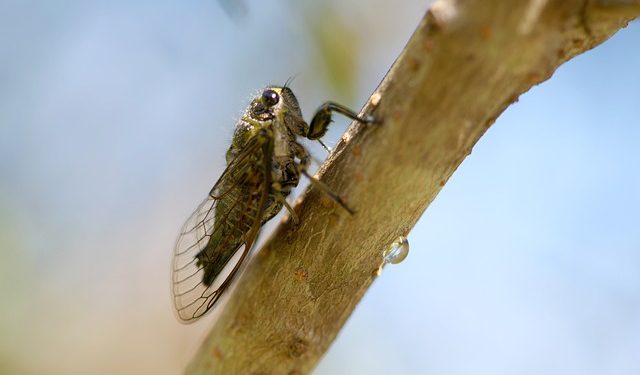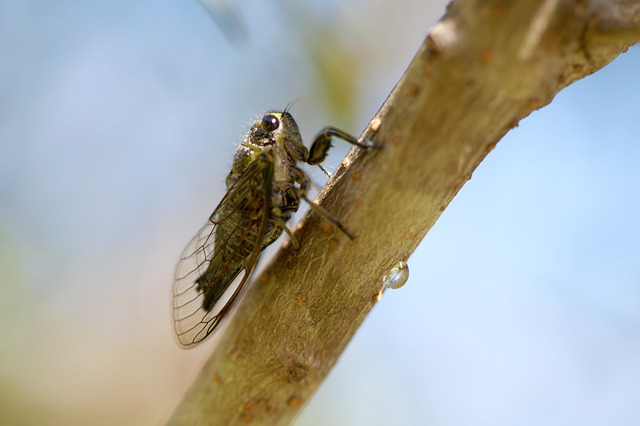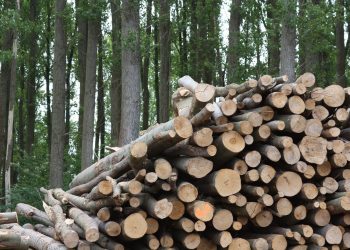Call it protein on the fly, on the shuffle or on the crawl. Insects are the future of food, offering a choice that is healthy for people and the planet as the world battles malnutrition and climate change.
In the insect kingdom, there is something to please every palate. From crunchy crickets (Acheta domesticus) and tangy termites to wacky mopane worms (Gonimbrasia belina) and glorious grubs, insects are hopping on the global menu as a nutritious food source in an increasingly hungry and underfed world. Insects are credited with delivering higher levels of protein than other animal products.
There is income to be made from insects, too. Smallholder farmers and entrepreneurs in Africa are gathering, processing and farming insects for a new and growing food and feed market.
Mouth-watering mopane worm
“Mopane worms are nutritious, I tell you they are better than meat and milk,” opinions Lethi Moyo, a 67-year-old farmer in Mtshabezi village in Zimbabwe’s Matabeleland South province. “They complement any meal and we must eat them because they are good.”
Moyo has been gathering and preparing mopane worms, the caterpillar of the emperor moth species, for more than five years. In June 2021 she made more than US$160 from selling salted and dried mopane worms.
“Customers come to my home so that I do not need to travel to the urban centres to sell my mopane worms,” says Moyo, who grows maize on a hectare plot. “Some come from as far as Harare and South Africa to buy for resell.”
In December 2020 she harvested and processed two 20-liter buckets of mopane worms and in March and this year she collected five buckets full that she sold for US$32 each.
Another farmer, Noddy Dube from Dondoria village, says she has informally traded mopane worms for more than 20 years. Income from selling the worms has put her children through school, though she worries that the worm could be threatened from over harvesting. In the 2020/21 farming season, Zimbabwe had a bumper harvest of the worms, coupled with a good rainy season.
“This year the harvest has been good but I worry if in the future we will have the mopane worms because many people have harvested them and at the same time the trees have been destroyed in some areas,” Dube explained. In 2020 she managed to collect and sell five 20-liter buckets of the worm and this year, she is expecting to sell about eight buckets.
Mopane worms are big business in Southern Africa, where the worms are broadly distributed and enjoyed as a delicacy. Mopane worms are also widely traded across the region and beyond, mostly informally. Unofficial estimates put the trade in this tasty insect at more than US$1 million annually.
“Mopane worms, for example, are extremely rich in nutrients compared to many edible insects, with protein levels of up to 74, which is superior to that of plant and animal origin,” says, Chrysantus Tanga, a research scientist with the Insect for Food, Feed and Other Uses (INSEFF) programme at the International Centre of Insect Physiology and Ecology (icipe) in Kenya.
Sustainable food and feed
For generations, insects have been enjoyed as a snack or part of a meal in many countries in Africa. There is a growing interest in insects as a sustainable food with the global push to reduce the impact of agriculture production on the environment.
This year, the European Union granted approval for the use of dried yellow meal worm beetle (Tenebrio molitor) as “novel food.”
While some people will cringe at swallowing stink bugs (Encosternum delegorguei), flying termites and spiky skinned worms, insects provide “climate smart” protein and other nutrients that can be found in meat, research evidencesuggests.
Eating fruits and vegetables, including plant-based imitation meat and insects, helps in the transition to more healthy and sustainable diets, scientists suggest.
Insects are also good for the environment because of their tiny carbon footprint, argues Robert Musundire, an Associate Professor of Entomology at Chinhoyi University of the Technology in Zimbabwe, citing their low carbon and methane gas emissions compared to cattle and pigs.
Tanga concurs, noting that “80 to 100 percent of an insect’s whole body is consumable. Nothing to goes as waste to the environment. For cows, only 40 percent is consumable, chicken only 56 percent and pigs about 60 percent. Also, insects require fewer amounts of water and land, and they also have reduced ecological footprint.”
Climate change-busting food source
Insect consumption has long been viewed as food for the poor, Musundire said. With growing health consciousness, he is convinced that new emphasis should be placed on sharing the evidence of edible insects’ nutritional benefits.
Eating green is increasingly being touted as a solution to climate change. Try a bug burger, a termite taco or simply sink your teeth into a warm mopane worm scone. If such a taste is not yet acquired, a new recipe book on the wholesomeness of insects could whet the appetite. A collaborative project between the Chinhoyi University of Technology and the Agriculture for Food Security (AgriFoSe2030) Programme of the Swedish University of Agriculture Sciences (SLU) produced Secrets of African Edible Insect Cookery to promote insect-based foods.
The Chinhoyi University of Science and Technology, which has produced more than 20 publications on edible insects, is currently conducting a study on the biofortification of porridges with termite powders. The university has received a £1 million grant through a United Kingdom consortium to conduct this study.
“Insects provide a lot of good nutritional minerals, including anti-oxidants, but the challenge is they are not appealing as food,” Musundire explains. He admits winning over insect-phobic consumers is hard.
“We have to bring innovation to insects as food so that they are more appealing to the eye and are tastier, and then we can initiate those who are not used to eating insects.”
Describing edible insects as complementary food, Musundire has published a book on the preparation edible insects and consumption practices.
Business on the fly
Insects are also making a buzz in animal feed with innovators in Zimbabwe, South Africa and Kenya breeding the black soldier fly (Hermetica Illucens) as livestock feed.
The International Centre for Insect Physiology and Ecology in Kenya has developed breeding protocols and feed formulations on using black soldier flies (BSF) in animal feed, opening the door for insect feed entrepreneurs such as InsectiPro, a company in Kenya.
Tanga and his partners are credited as the first in Africa to successfully engage policymakers in the creation of an enabling environment for the rapid adoption of insect-based protein feed technologies. This led to the development of standards in support of legislations and policies approving the use of insect-based protein ingredients in compounding animal feeds in Kenya and Uganda.
Research shows that BSF can knock down the cost of livestock feed by up to 30 percent, said Musundire, whose university has trained more than 2000 farmers across Zimbabwe in techniques for farming the BSF.
Blessing Mutedzi is a 46-year-old insect farmer who has been trained in breeding insects. He raises crickets, mopane worms and black soldier flies. His family owned business, Mopane Worm Enterprises, also processes crickets and mopane worms for sale.
Mutedzi, from Femberwi village in the Marange District in Manicaland, eastern Zimbabwe, was attracted to insect farming after observing how his grandfather gathered the insects from the wild and started experimental breeding. He breeds the insects in nurseries under greenhouses, where they are aggregating more than 2,000 pupae at a time.
“Insect farming has presented an opportunity for us to provide quality and healthy food that people can afford,” Mutedzi said in an interview. His company is processing about 10 kilograms of crickets in 46 days, which sell for US$30/kg.
“Training on insect production is important because you are able to guide the business correctly,” Mutedzi said. “It helped me to improve my breeding and enhance the processing of the mopane worms and black soldier flies.”
By Busani Bafana





















































Discussão sobre este post